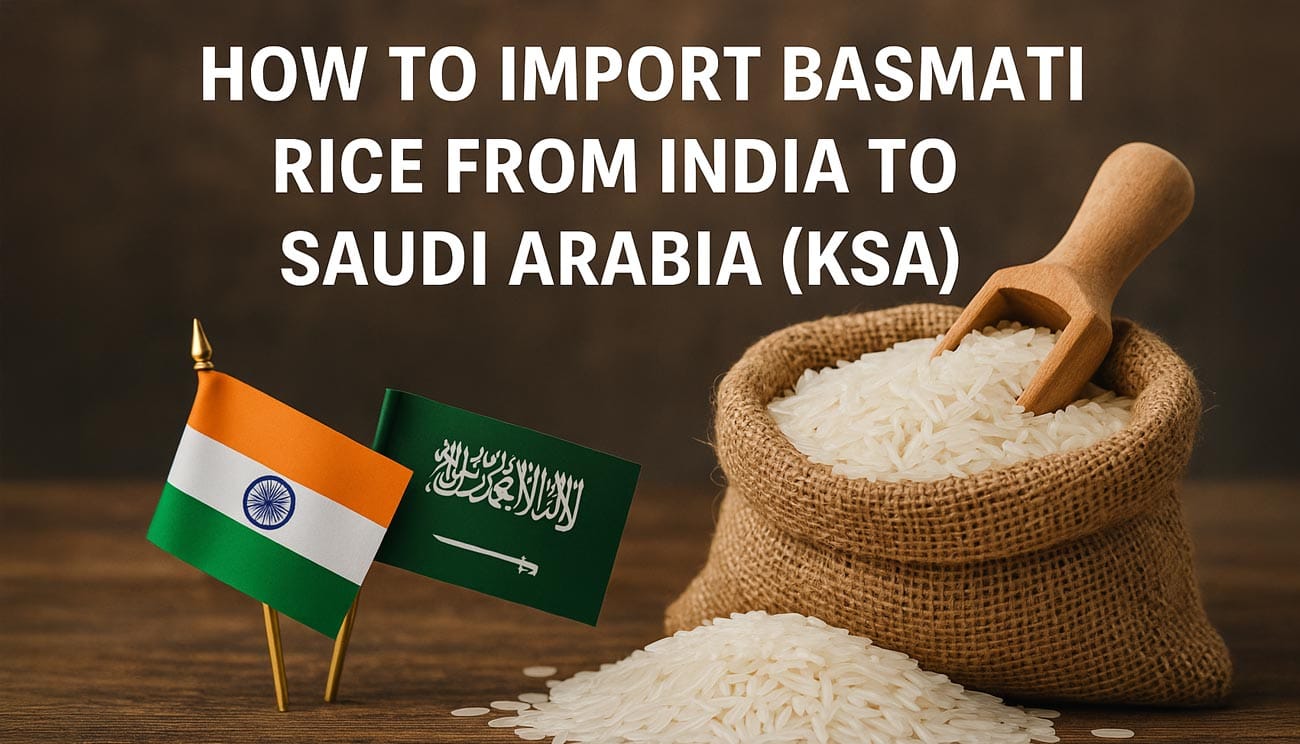
05 Aug How to Import Basmati Rice from India to Saudi Arabia (KSA)
Indian Basmati – A Staple in Saudi Homes
From biryani to kabsa and mandi, basmati rice is deeply woven into Saudi culinary culture. India remains the top source for long-grain, aromatic rice — and if you’re planning to import basmati rice into Saudi Arabia, now is the time.
In this 2025 guide, we’ll walk you through how to legally, efficiently, and profitably import basmati rice from India into the Kingdom of Saudi Arabia.
1. Why Saudi Arabia Imports Basmati Rice from India
India is the world’s largest producer and exporter of basmati rice. Saudi Arabia continues to be one of its biggest buyers for reasons like:
- Naturally aged, aromatic rice
- Longer grains (up to 8.4mm)
- Better cooking texture and aroma
- Competitive pricing for bulk buyers
- Halal-certified exports with Arabic labelling
2. Legal Requirements for Importing Rice into KSA
To import basmati rice to Saudi Arabia, you’ll need:
– A valid commercial registration (CR)
– Registration with Saudi Food and Drug Authority (SFDA)
– Tax registration (ZATCA)
– GSO & SASO compliance for food packaging (for retailers)
– Membership with local Chamber of Commerce
Once you have the licenses, your Indian exporter will help with the rest.
3. Documents Required from the Indian Exporter
To avoid clearance delays at Jeddah or Dammam ports, ensure your exporter (like SKRGM) provides:
- Certificate of Origin (India)
- Halal Certificate
- Fumigation & Phytosanitary Certificates
- Invoice + Packing List
- Arabic and English labelling on packaging
- Shipping documents (Bill of Lading, etc.)
4. Packaging Preferences in the Saudi Market
Packaging plays a major role in consumer perception. For Saudi Arabia, buyers prefer:
- Arabic + English branding
- PP, BOPP, or jute bags in 5kg, 10kg, 20kg & 40kg sizes
- Bulk 25kg/50kg packs for foodservice buyers
- Vacuum-sealed premium rice for retail chains
Retailers often request private label rice with their own brand name. Make sure your exporter offers this (SKRGM does).
5. Shipping & Delivery Timeline to Saudi Arabia
Most Indian rice shipments to KSA are routed via:
- JNPT or Mundra Port (India) → to Jeddah or Dammam Port (KSA)
- LCL or FCL containers, depending on volume
- Transit time: 8 to 14 days
Your exporter should provide live tracking and document handling throughout.
6. Cost Breakdown of Rice Imports to Saudi Arabia
Here’s a basic estimate for a 20-ft rice container:
- Rice cost: ₹60–₹90 per kg (depending on variant & season)
- Freight: ₹70,000–₹100,000 (~SAR 3,300–4,800)
- Saudi port charges & clearance: SAR 2,000–3,500
- Local transport to wholesaler/distributor: Extra
📦 Estimated landed price per kg: SAR 3.5 – SAR 6.0 depending on quality & volume.
7. Best-Selling Indian Basmati Varieties in KSA
- 1121 Steam / Sella / Raw
- Pusa Basmati
- 1509 Basmati
- Broken Basmati (affordable option)
- Long Grain White Rice (non-basmati)
These are sold across Lulu Hypermarket, Panda, Othaim, and online platforms.
8. Why Choose SKRGM (New Rishta Agro India Ltd)?
SKRGM is already exporting Indian basmati rice to buyers in Saudi Arabia.
✅ Halal-certified exports
✅ Experience with Arabic packaging & customs
✅ Support for small and large volume buyers
✅ Fast shipment & container tracking
✅ Competitive pricing & custom labelling
Start Importing Basmati to Saudi Arabia
Demand for Indian basmati rice in KSA is rising. With the right exporter and paperwork, you can start or scale your rice import business profitably.
Whether you’re importing for supermarkets, restaurants, or wholesale supply — make 2025 your year to grow.
FAQs
Q. What is the minimum quantity I can import to Saudi Arabia?
You can start with as low as 5 MT if your exporter supports a small MOQ.
Q. Can I get my own branding on the rice?
Yes, private labelling is available in Arabic and English.
Q. Do I need Halal certification?
Yes, and your Indian exporter must provide a valid Halal certificate.
Q. How long does shipping take?
Average is 8–14 days, depending on port clearance.


Sorry, the comment form is closed at this time.